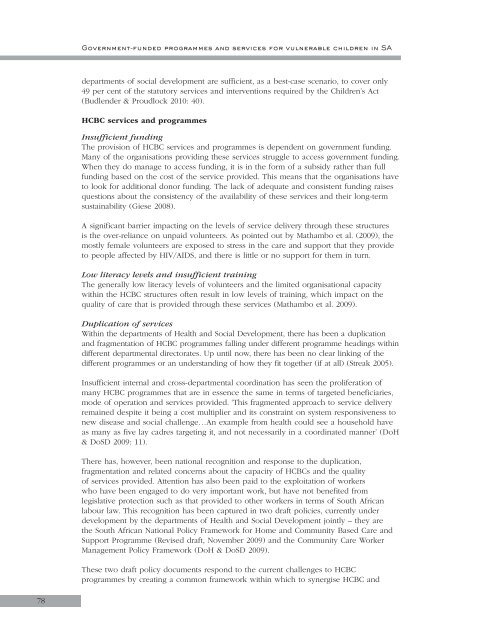Government-funded programmes and services for vulnerable - Unicef
Government-funded programmes and services for vulnerable - Unicef
Government-funded programmes and services for vulnerable - Unicef
Create successful ePaper yourself
Turn your PDF publications into a flip-book with our unique Google optimized e-Paper software.
<strong>Government</strong>-<strong>funded</strong> <strong>programmes</strong> <strong>and</strong> <strong>services</strong> <strong>for</strong> <strong>vulnerable</strong> children in SA<br />
departments of social development are sufficient, as a best-case scenario, to cover only<br />
49 per cent of the statutory <strong>services</strong> <strong>and</strong> interventions required by the Children’s Act<br />
(Budlender & Proudlock 2010: 40).<br />
HCBC <strong>services</strong> <strong>and</strong> <strong>programmes</strong><br />
Insufficient funding<br />
The provision of HCBC <strong>services</strong> <strong>and</strong> <strong>programmes</strong> is dependent on government funding.<br />
Many of the organisations providing these <strong>services</strong> struggle to access government funding.<br />
When they do manage to access funding, it is in the <strong>for</strong>m of a subsidy rather than full<br />
funding based on the cost of the service provided. This means that the organisations have<br />
to look <strong>for</strong> additional donor funding. The lack of adequate <strong>and</strong> consistent funding raises<br />
questions about the consistency of the availability of these <strong>services</strong> <strong>and</strong> their long-term<br />
sustainability (Giese 2008).<br />
A significant barrier impacting on the levels of service delivery through these structures<br />
is the over-reliance on unpaid volunteers. As pointed out by Mathambo et al. (2009), the<br />
mostly female volunteers are exposed to stress in the care <strong>and</strong> support that they provide<br />
to people affected by HIV/AIDS, <strong>and</strong> there is little or no support <strong>for</strong> them in turn.<br />
Low literacy levels <strong>and</strong> insufficient training<br />
The generally low literacy levels of volunteers <strong>and</strong> the limited organisational capacity<br />
within the HCBC structures often result in low levels of training, which impact on the<br />
quality of care that is provided through these <strong>services</strong> (Mathambo et al. 2009).<br />
Duplication of <strong>services</strong><br />
Within the departments of Health <strong>and</strong> Social Development, there has been a duplication<br />
<strong>and</strong> fragmentation of HCBC <strong>programmes</strong> falling under different programme headings within<br />
different departmental directorates. Up until now, there has been no clear linking of the<br />
different <strong>programmes</strong> or an underst<strong>and</strong>ing of how they fit together (if at all) (Streak 2005).<br />
Insufficient internal <strong>and</strong> cross-departmental coordination has seen the proliferation of<br />
many HCBC <strong>programmes</strong> that are in essence the same in terms of targeted beneficiaries,<br />
mode of operation <strong>and</strong> <strong>services</strong> provided. ‘This fragmented approach to service delivery<br />
remained despite it being a cost multiplier <strong>and</strong> its constraint on system responsiveness to<br />
new disease <strong>and</strong> social challenge…An example from health could see a household have<br />
as many as five lay cadres targeting it, <strong>and</strong> not necessarily in a coordinated manner’ (DoH<br />
& DoSD 2009: 11).<br />
There has, however, been national recognition <strong>and</strong> response to the duplication,<br />
fragmentation <strong>and</strong> related concerns about the capacity of HCBCs <strong>and</strong> the quality<br />
of <strong>services</strong> provided. Attention has also been paid to the exploitation of workers<br />
who have been engaged to do very important work, but have not benefited from<br />
legislative protection such as that provided to other workers in terms of South African<br />
labour law. This recognition has been captured in two draft policies, currently under<br />
development by the departments of Health <strong>and</strong> Social Development jointly – they are<br />
the South African National Policy Framework <strong>for</strong> Home <strong>and</strong> Community Based Care <strong>and</strong><br />
Support Programme (Revised draft, November 2009) <strong>and</strong> the Community Care Worker<br />
Management Policy Framework (DoH & DoSD 2009).<br />
These two draft policy documents respond to the current challenges to HCBC<br />
<strong>programmes</strong> by creating a common framework within which to synergise HCBC <strong>and</strong><br />
78
















